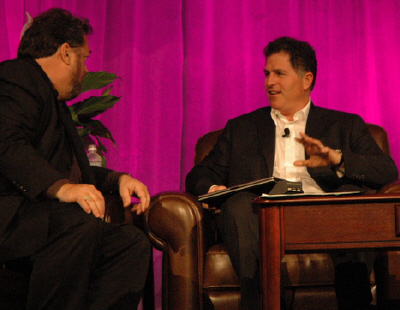Michael Dell set on 'changing the approach' to stay ahead

Mark Anderson, host of the Future in Review conference, warmed up Michael Dell for his interview by proclaiming him the best manager in the world. The Dell founder and Chairman didn't shed too much light on challenges the company faces going into its 22 year. The PC market has been slowing, and Dell lost some share to HP and others during the first quarter of this year, and the company's stock has slipped during the last year.
Dell admitted that he underestimated what was going on competitively. Anderson quipped that Dell didn't think that Carly Fiorina would resign, replaced by Mark Hurd, who has proven to be tougher competition. "We used to be 3 times more profitable than competitors, now we are 2.5 times more profitable than competitors," Dell said. "We are changing our approach, making investments around the customer experience to take it to a whole different level, focusing on the fundamentals around supply chain, great products, and great servers. There are lots of opportunities for us to do quite a bit better than last year."
In response to a question about the viability of the Dell model for consumer sales versus retail stores, Dell said. "In the U.S. over the last three years our consumer market grew from 6 percent to about 30 percent share of market....Looking out the next ten years more people going online instead of to a store. In the last quarter we had 400 million visits by 140 million unique users at Dell.com. Ultimately it's a better model for us and the customer."
On the technology front, PCs will be easier to use in the home. Regarding Microsoft's Media Center PC, Dell said that in PC centric homes it won't be an overnight phenomenon. "You could envision more than one answer in the consumer electronics world. A PC-centric person probably has digital music and photography and it's easy to migrate into their computing," Dell said. "We are already seeing usage emerge in a fairly gradual way," he added.

Dell doesn't expect the desktop to disappear. "If you want the fastest, most powerful machine, you almost always get a desktop," Dell said. Emerging markets are also playing a big role, he said. Dell has a $600 million deal with Mexico, putting computers in all the schools.
Over the next several years, computers will continue to take many forms, Dell said. "There won't be one universal device for all uses and applications. Most important is consistency of data across all the devices."
In terms of new markets, Dell said Dell have 11 percent share of market outside the U.S., yet 70 percent of the market is outside the U.S. Revenues from outside the U.S. grew from $12 billion to $22 billion over the last three years. "We look at the GDP in different countries, at cell phones a lot as a precursor to computing and where there is some kind of competitive structure for telecom...those markets are taking off like crazy," Dell said. He cited Brazil as growing 74 percent for Dell in a year. Korea has 72 percent real broadband penetration and massive multiplayer online gaming and just a hyper-example of what can happen in an economy, he said. Countries in the former Soviet Union are attractive markets, but Russia and other areas have corruption problems that make it difficult to do business.
A lot of countries in Southest Asia are poised for growth--Singapore, Malaysia and Thailand all point in that direction, he said Dell has a factory in Malaysia and accounts for about 7 percent of its GDP. "Businesses in India and China growing at roughly 40 percent," Dell said, "and it looks quite sustainable." China is Dell's third largest market in the world, and the company has two factories in China and will spend $18 billion in procurement in China this year. In India, Dell plans to add 10,000 employees to the current 10,000 over the next three years.